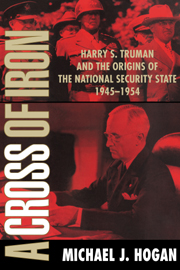Book contents
- Frontmatter
- Contents
- Preface and Acknowledgments
- 1 The National Security Discourse: Ideology, Political Culture, and State Making
- 2 Magna Charta: The National Security Act and the Specter of the Garrison State
- 3 The High Price of Peace: Guns-and-Butter Politics in the Early Cold War
- 4 The Time Tax: American Political Culture and the UMT Debate
- 5 “Chaos and Conflict and Carnage Confounded”: Budget Battles and Defense Reorganization
- 6 Preparing for Permanent War: Economy, Science, and Secrecy in the National Security State
- 7 Turning Point: NSC-68, the Korean War, and the National Security Response
- 8 Semiwar: The Korean War and Rearmament
- 9 The Iron Cross: Solvency, Security, and the Eisenhower Transition
- 10 Other Voices: The Public Sphere and the National Security Mentality
- 11 Conclusion
- Selected Bibliography
- Index
4 - The Time Tax: American Political Culture and the UMT Debate
Published online by Cambridge University Press: 03 May 2010
- Frontmatter
- Contents
- Preface and Acknowledgments
- 1 The National Security Discourse: Ideology, Political Culture, and State Making
- 2 Magna Charta: The National Security Act and the Specter of the Garrison State
- 3 The High Price of Peace: Guns-and-Butter Politics in the Early Cold War
- 4 The Time Tax: American Political Culture and the UMT Debate
- 5 “Chaos and Conflict and Carnage Confounded”: Budget Battles and Defense Reorganization
- 6 Preparing for Permanent War: Economy, Science, and Secrecy in the National Security State
- 7 Turning Point: NSC-68, the Korean War, and the National Security Response
- 8 Semiwar: The Korean War and Rearmament
- 9 The Iron Cross: Solvency, Security, and the Eisenhower Transition
- 10 Other Voices: The Public Sphere and the National Security Mentality
- 11 Conclusion
- Selected Bibliography
- Index
Summary
Between 1945 and 1948, as we have seen, Truman had tried to strike a balance between the warfare state and the welfare state. He wanted to equip the country for its new role as the global defender of democracy, but on terms that squared with American tradition and with his own domestic agenda, including a balanced budget and a modest expansion of the social programs that had grown out of the New Deal. With these goals in mind, he had begun to redirect resources from wartime to peacetime purposes and had made some progress in unifying the armed forces and creating a national security organization that dovetailed with the principle of civilian leadership. But progress had been slow, some ground had been lost after the Czech crisis, and the same issues would have to be refought in the years ahead. Nor were they the only issues. The Truman administration also had to mobilize the military manpower and the economic and scientific resources needed to sustain a credible deterrent. The story of American state making included major battles in these areas, too, and of these battles none was more hard fought than the one over universal military training (UMT).
Truman waged this battle, the subject of little scholarship thus far, even as he was struggling to reduce the defense budget and bring the armed forces under better control, and the battle itself revealed themes that were also evident in these concurrent struggles.
- Type
- Chapter
- Information
- A Cross of IronHarry S. Truman and the Origins of the National Security State, 1945–1954, pp. 119 - 158Publisher: Cambridge University PressPrint publication year: 1998



